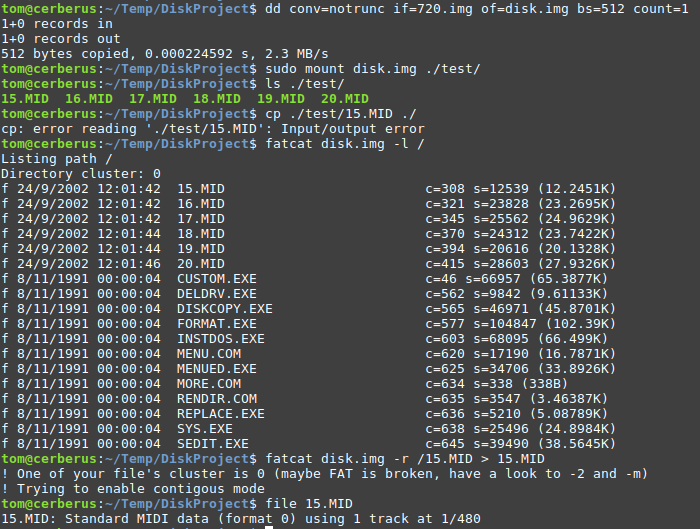So I was reminded by a reader that I don't physically need a 720KB disk just to get the boot sector from one, since I can just format an image file as if it was the real thing. I still need the physical disks to eventually get the content back into the piano, but for now I can fiddle around with the images.
The short version is, using the boot sector from the 720KB floppy worked better, but still isn't right. The garbage file names went away, but most of the files aren't listed. Copying the files that do show up just results in an I/O error, but using the fantastic fatcat tool I'm actually able to extract the files despite the wonky FAT. The output of fatcat incidentally shows there's even more hidden files lurking around:

While pulling out one of the MIDI files intact and actually being able to play it was very encouraging, I've decided to change my approach. Rather than trying to convert the disk to a normal floppy, I'm going to start studying the format of the disks and make a tool that can pull the files/info out without having to patch the image. They're clearly in there, I just need to get them out.
So if you'll excuse me, I have a date with hexedit.
 Tom Nardi
Tom Nardi
Discussions
Become a Hackaday.io Member
Create an account to leave a comment. Already have an account? Log In.
I saw your project and it piqued my interest though it looks you have things in hand but if not, this may help.
Disk and file type support for Disklavier pianos - http://www.kuhmann.com/Disklavier/Disk%20and%20File%20Formats%20for%20Midi%20Player%20Pianos.pdf
In case you run into crazy DRM or the disk is damaged and you can't copy with a PC then you can read the disk flux directly - https://hackaday.com/2019/02/19/flux-engine-reads-floppies/
The flux data can then be made back into disk images - https://github.com/brouhaha/fluxtoimd
Are you sure? yes | no
Thanks for the link, I appreciate it. Info on these players/disks can be hard to come by, so really anything helps. I only just realized today that not all the disks my brother gave me to work with are actually the same. The tricks I used on this disk, don't work on the others. Like this document illustrates, it could be down to the different models of player and what they were/are capable of reading.
All the more reason to really dig in there deep and see how these things work.
Are you sure? yes | no